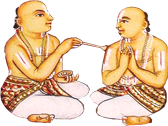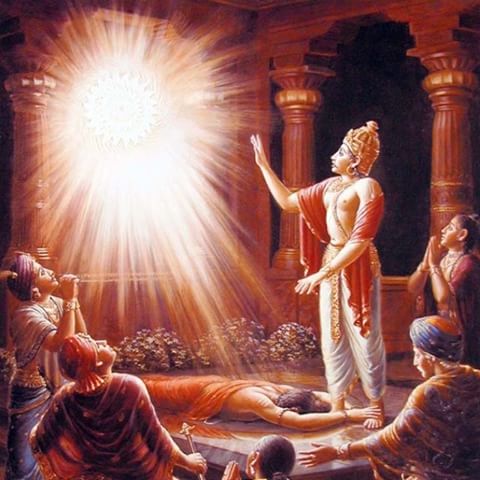
The devotees of Vishnu are called as Vainavan in tamil and Vaishnavan in sanskrit. Lord Vishnu is Omni present. Every atom of a thing arises and dissolves with Lord Vishnu. Since everything has got a relationship with Vishnu there arise a question as to why a separate term called Vainavam.
We have seen instances where a father who has many children is especially affectionate towards one, as that particular child follows the father’s words and behaves as per his desire.  Though rest of the children calls him father, but this particular child is referred to as his father’s son. Similarly Perumal who is impartial is affectionate towards some of his beloved devotees as they follow his divine order. Bhagavan proclaims that Veda and the texts that is based upon Veda are his divine ordain, those who trespasses them do not belong to me though they claim otherwise.
Though rest of the children calls him father, but this particular child is referred to as his father’s son. Similarly Perumal who is impartial is affectionate towards some of his beloved devotees as they follow his divine order. Bhagavan proclaims that Veda and the texts that is based upon Veda are his divine ordain, those who trespasses them do not belong to me though they claim otherwise.
Those who are Vaishnavas should be a Satgunavilambi so as to be respected by Mahan-s and be the recipient of Lord Achuthan’s affection.
 Scriptures states that those who are bereft of anger, ego, torturous instinct, lust, those who are devoted to their parents, compassionate to all creatures, not jealous of others, who speaks truth, compassionate towards Brahmins, disinterest in other’s wives, those who follow ekadasi fasting, those who chant Hari nama, perform Hari puja and wet their head and heart with Vishnu pada tirtam, those who do not mingle with theist of other faiths are termed as Vaishnavas. A Vaishnava should possess satvic quality as their Lord Vishnu is satvic by nature. One gets such satvic qualities if one is a devotee of Vishnu. Vedas glorify Bhagavan Vishnu as the repository of all supreme qualities.
Scriptures states that those who are bereft of anger, ego, torturous instinct, lust, those who are devoted to their parents, compassionate to all creatures, not jealous of others, who speaks truth, compassionate towards Brahmins, disinterest in other’s wives, those who follow ekadasi fasting, those who chant Hari nama, perform Hari puja and wet their head and heart with Vishnu pada tirtam, those who do not mingle with theist of other faiths are termed as Vaishnavas. A Vaishnava should possess satvic quality as their Lord Vishnu is satvic by nature. One gets such satvic qualities if one is a devotee of Vishnu. Vedas glorify Bhagavan Vishnu as the repository of all supreme qualities.
Maithreya Upanishad states Bhagavan Vishnu possess satvic quality. It also states that one who is born as a devotee of Vishnu irrespective of his caste uplifts those who are born in his caste to attain salvation. The ancestors rejoice about the birth of such a Vaishnava and hails him as the one who has been born to destroy the sorrows.
He who receives the grace of the Satvic Lord Vishnu shall remain a Satvic person. A Vaishnavan is one who is pious by nature and vice versa. There are nine types of devotion that are adhered by a Vaishnavan such as performing Salagrama aradhana, worshipping the deities of Perumal, chanting mantras, participating in yajnas, meditation, singing the glories of Perumal, pranamam, adorning the vaishnava symbols and tadi aradhanam. One who meditates up on Vishnu will reap all glories. One should also strive to be a Vaishnavan both internally and externally.
A Vaishanva wears thulasi nalinaksha mala (lotus and thulasi beads) as lotus and thulasi gives purity to the mind. Thulasi is considered as the best medicine. Thulasi prevents us from many carnal desires. If one cannot wear this mala at all times, one can wear during Bhagavat aradhanam and while performing Mantra japam.
A Vaishnavan has to adorn the Sangu Chakra symbols as it is the important divine weapons of Perumal for which one has to undergo Samasrayanam and Pancha Samaskaram. A Paramaikanti yearns for Paramapadam therefore prays to Lord Parandhaman. Pancha Samaskaram is important for a Paramaikanti. He has to adorn Urdhva pundram on his fore head which has to be drawn in upward direction from the tip of the nose to the forehead signifying Perumal’s lotus feet, there has to be a gap in between to draw a thin line of Sri choornam which signifies Piratti. Nam azvar sings the glory of Urdava pundram in his Thiruvaimozhi pasuram 1-9-10.
While all the living beings are afraid of Yama, but Yama is severely scared of a Vaishanavan. Yama preaches his servants not to go near a Vaishanvan who sincerely meditates upon Bhagavan Narayanan because they are the devotees of Achuthan being worshipped by the demi gods Brahma and Rudra. He says even if they are sinners yet he does not possess the authority to punish them. I worship every day those who chants the holy names of Vishnu.
 One can partially escape even if one has enmity against the Lord but there is no escape if one has enmity against his devotees. The story of Dhurvasa muni was a classic example which highlights the greatness of King Ambarisan a staunch Vishnu devotee. Dhuravasa muni was a terror to others, but he escaped the punishment for his offence only after having sought forgiveness from King Ambarisan. Another example as stated by a poet while describing the greatness of Bhagavatas though people walk miles together even while the sun scorches their head and body but they cannot tread even a few steps on a hot sand. Such are the greatness of a Vaishnavan.
One can partially escape even if one has enmity against the Lord but there is no escape if one has enmity against his devotees. The story of Dhurvasa muni was a classic example which highlights the greatness of King Ambarisan a staunch Vishnu devotee. Dhuravasa muni was a terror to others, but he escaped the punishment for his offence only after having sought forgiveness from King Ambarisan. Another example as stated by a poet while describing the greatness of Bhagavatas though people walk miles together even while the sun scorches their head and body but they cannot tread even a few steps on a hot sand. Such are the greatness of a Vaishnavan.
The original article is written by Sri U Ve. Vidwan E V Krishnaswamy Iyyangar, Thiruvattipuram, in Tamil. This above English translation has been done by Smt Jayashree Ramanujam








